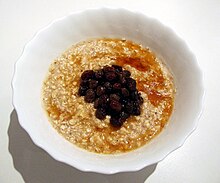porridge
Porridge , also porridge ( ) [ ˈpɒrɪdʒ ] (English for "porridge") or oatmeal ( ) [ ˈəʊt.miːl ] (US-American for "oatmeal"), is a cereal porridge ( Grits ), which is prepared from oat flakes or oatmeal as well as water and / or milk . Oat soup is the diluted variant; Gruel is the gruel that is strained after cooking oatmeal.
preparation
The oatmeal is boiled in water and milk until it has a creamy consistency. This is the main difference to muesli , in which the oat flakes are only soaked. It is often refined with cream , sugar , honey or even salt . Depending on your taste, you can also cook apples and raisins, for example, or add other ingredients after cooking (for example, fruit such as bananas, cherries or blueberries or maple syrup, nuts, cinnamon, etc.).
The food industry now offers instant meals like oatmeal. These crushed and rolled oat flakes, also known as melting flakes, dissolve quickly when stirred into liquids, so they do not require boiling (in contrast to untreated oat flakes). Instant oat flakes are available in different flavors, such as with raisins, nuts or with cinnamon and sugar. In return, some cooks are starting to develop their own variations of the dish.
history
Eating porridge or porridge-like dishes has been part of the entire history of civilization . Scientists now assume that the cooking of grasses was already practiced around 12,000 years ago and went hand in hand with the development of mankind from nomadic hunter-gatherers to sedentary farmers. The processing of grain was subsequently not limited to the production of porridge, it also opened up the possibility of thickening the resulting porridge further and baking it as flat cakes or in brick form on hot stones or in the embers of the fire, making it durable and make it portable. This civilizational innovation - from porridge to bread - can be demonstrated almost simultaneously and on all continents. Oatmeal or porridge can therefore be described as the predecessor of bread.
In the 16th century oat butter was a food of the poor in Swabia, Allgäu and Thurgau. A controversy arose between doctors Lorenz Fries and Hieronymus Bock about the nutritional value of oats.
In 1518, in his Spiegel der Medicin , the Colmar doctor Lorenz Fries reported how he went to a stingy priest's Latin school in his youth and had to eat porridge every day. Fries judged:
- “Haber as Galienus says on the first book about the piss in the cap. Auena / ſo it is a eißpeiß of the future animals and not the men. […] But in vil one ends up in the menſchen at vile / dz erſt vnd dz letſt iſt allweg habermůß / as the Algöwer / Swabians and Thürgöwer / there one makes between stuffing brown / porridge / thin / and many things cooked by habermůß / ett thick dz a wolbeſchlagner gul ran over it and not fell. [...] Quite a few milk darzů / forwere whee you werent o rough / nem miraculously / that they are about to burst from this food. Quite a few ſagen the sick ſei gůt ein habermüßlin. No, if I don’t say it is good in any disease […] my advice is you let the horse go to the owners. "
In 1539, in his herb book, Hieronymus Bock contradicted:
- "Habern. ... From the strength and strength. Dje yhenige ſo in Algew / Torgaw / Schwaben / and other rough ends or lendern wonen / they know how to cook the sweet porridge from Habermeel / thin and thick / roast vnd zwerch ſtopffer porridge / Derhalben Pliny doesn on Eessen / and it is not possible to get an on onound person / when ſie is right. There are also the men / ſo ſtets Haber můßer and the same need / ſtercker and geſunder then the old ſo do ſtets Apitios [apitios cibos = goodies? ] have cakes in jren. Who wants to see eye hatt vnnd / the must confess / that more kranckheyt / siechtagen vnnd Auss the full cake vnnd Apotecken / neither sunst grow from natural / after we wöllen vns (wiewol offt warned) beware nit. ... "
United Kingdom
Porridge is consumed as a hot breakfast meal in Great Britain , but also in other countries, and it used to be the lunch or evening meal in working-class families. The dish originally comes from Scotland . In the Scottish Highlands , the Gaelic word is brochan . It used to be customary not to add anything to the porridge itself, but to put cold milk, cream or buttermilk as a dip on the table and then dip the full spoon there while eating. Porridge in Scotland was only sweetened for children, while the English mostly added sugar. Today, porridge is usually served pure with separate ingredients for sweetening, such as maple syrup or brown sugar. In Scotland, porridge is also served heartily salted.
literature
- Porridge. In: Alan Davidson : The Oxford Companion to Food. 2nd edition, edited by Tom Jaine. Oxford University Press, Oxford et al. 2006, ISBN 0-19-280681-5 .
Web links
Individual evidence
- ^ Sybil Kapoor: How to make perfect porridge. In: The Guardian . January 7, 2010.
- ↑ Verival: The Millennia-Old History of Porridge. August 6, 2019.
- ↑ CG Kühn. Claudii Galeni opera omnia. Leipzig 1823, Volume VI, p. 522. (De alimentorum facultatibus, lib. I, Cap. XIV: De bromo.)
- ↑ Mirror of Medicine. Strasbourg 1518, sheet 38v – 39r.
- ↑ Pliny the Elder. 1st century Naturalis historia, Book XVIII, § 149-50 (Chapter XLIV)
- ↑ Hieronymus Bock. Herbal Book 1539, Book II, Chapter 26, Sheet 22v
- ↑ Michael Eyl. MO Bircher-Benner. Okay and oatmuesli. In: Social Medicine. 15th year Basel August 1988, p. 67

